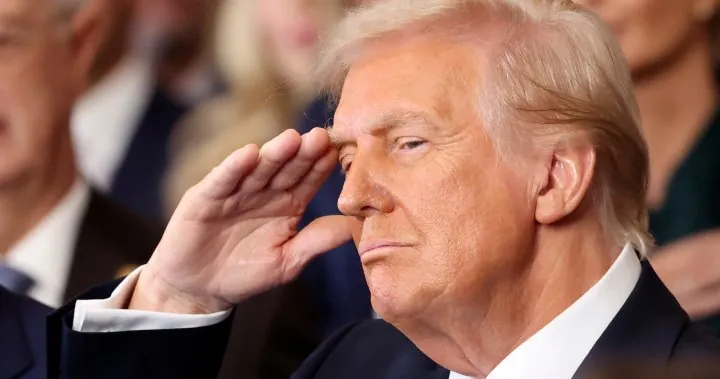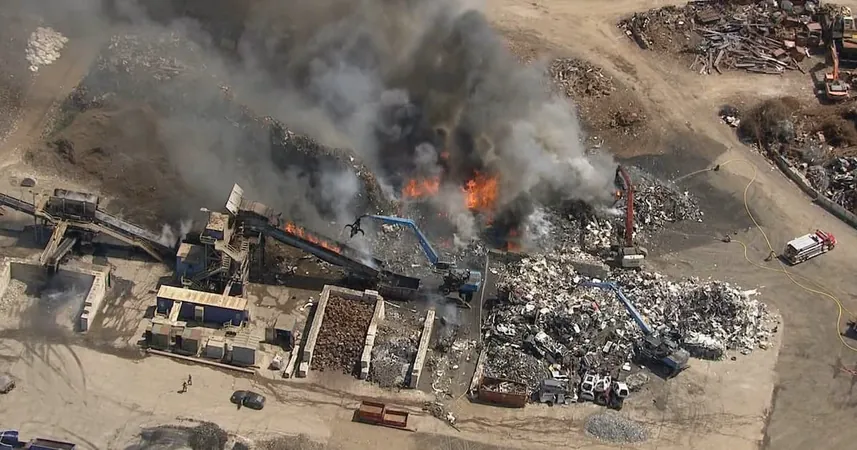
Trump Pulls U.S. Out of Paris Climate Agreement Again! What Does It Mean for the Planet?
2025-01-20
Author: Jacques
In a surprising turn of events, President Donald Trump announced that the United States will withdraw from the Paris climate agreement once again, making headlines as the world's largest historical emitter steps back from global efforts to combat climate change for a second time within a decade. This decision formalizes the U.S. position alongside Iran, Libya, and Yemen as the only nations not participating in this pivotal international pact aimed at limiting global warming to 1.5 degrees Celsius.
This withdrawal is rooted in Trump’s long-standing skepticism about climate change, which he has labeled a "hoax." This stance aligns with his broader agenda to deregulate the oil and gas industry, enabling companies to maximize extraction without environmental oversight. The White House’s recent announcement displeased environmental advocates who argue that delaying action on climate change could have dire consequences.
United Nations Secretary-General Antonio Guterres expressed hope that U.S. cities, states, and businesses will continue to lead by pursuing low-carbon and resilient economic growth. He emphasized the importance of the U.S. as a leader on environmental issues and highlighted the need for collective efforts to move forward urgently.
Interestingly, the U.S. currently ranks as the premier producer of oil and natural gas, thanks to booming drilling operations in places like Texas and New Mexico. These advancements, powered by fracking and the surge in global prices following Russia's invasion of Ukraine, position the U.S. as a critical player in the energy sector.
This isn’t Trump's first attempt to exit the Paris Agreement; during his first term, he initiated a similar withdrawal that took years to finalize. However, given the current political landscape, this new exit could occur within a year as it doesn't require adherence to a three-year commitment laid out in the original agreement.
Experts warn that this withdrawal could have catastrophic implications for global climate initiatives. Paul Watkinson, a former climate negotiator, noted that the U.S. is now in the middle of executing significant climate measures, making this exit particularly detrimental at a time when urgent action is essential.
A concerning UN report reveals the world is on track for an alarming temperature rise of over 3 degrees Celsius by the century's end, leading to severe consequences like intensified heatwaves, disastrous storms, and rising sea levels. However, political unrest, budget constraints, and ongoing wars worldwide are already hindering nations' abilities to cut emissions.
In stark contrast, Trump's predecessor, Joe Biden, aimed to establish the U.S. as a leader in global climate policy, promoting a shift away from fossil fuels through incentives and regulations. Trump has vowed to dismantle these initiatives, pledging to boost the economy while supposedly ensuring clean air and water.
As global competition in clean energy markets intensifies, experts, including Li Shuo from the Asia Society Policy Institute, highlight the risk the U.S. faces in falling behind China in sectors like solar energy and electric vehicles due to this withdrawal.
The impact of Trump's decision reverberates globally and raises the question: What future awaits our planet amid these shifting policies? With climate change already posing a monumental challenge, the stakes have never been higher. Will the U.S. be left behind in the race to innovate and implement green technologies, or will there be a turnaround? Only time will tell.









 Brasil (PT)
Brasil (PT)
 Canada (EN)
Canada (EN)
 Chile (ES)
Chile (ES)
 Česko (CS)
Česko (CS)
 대한민국 (KO)
대한민국 (KO)
 España (ES)
España (ES)
 France (FR)
France (FR)
 Hong Kong (EN)
Hong Kong (EN)
 Italia (IT)
Italia (IT)
 日本 (JA)
日本 (JA)
 Magyarország (HU)
Magyarország (HU)
 Norge (NO)
Norge (NO)
 Polska (PL)
Polska (PL)
 Schweiz (DE)
Schweiz (DE)
 Singapore (EN)
Singapore (EN)
 Sverige (SV)
Sverige (SV)
 Suomi (FI)
Suomi (FI)
 Türkiye (TR)
Türkiye (TR)
 الإمارات العربية المتحدة (AR)
الإمارات العربية المتحدة (AR)